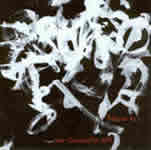|
|
 |
Dusted Reviews
Artist: Joe Giardullo 4tet Album: Now Is Label: Drimala Review date: Sep. 15, 2003 |

|
|
|
 |
What’s that old saying? ‘What one can do well, two can do better’? Musical partnerships are one of the most gratifying ways this time-tested adage plays out to perfection. The professional and personal friendship of saxophonists Joe Giardullo and Joe McPhee is but one example among the countless. Sharing the same first name along with an ever-deepening body of work, these two men continue to trace new trajectories for their creative energies. Previous collaborations have included the Bluette, with bassists Dominic Duval and Michael Bisio, and a duo recording, Specific Gravity, for Boxholder. Now Is arrives as the latest chapter following the artistic success of Shadow and Light, a disc recorded in the Stygian emotional wake of September 11th.
This time out, the overarching mood and temperament is lighter, but no less spiritually or contemplatively saturated. Giardullo and McPhee whittle down their usual horn arsenals, the former sticking solely to soprano saxophone and the latter employing only soprano, pocket trumpet and flugelhorn. It’s a decision that offers a somewhat dubious tradeoff – a chance to hear delegates of McPhee’s brass contingent in detail, but at the expense of his tenor, arguably his most expressive and viscerally satisfying horn. Completing the group are percussionist Tani Tabbal and the aforementioned Bisio on bass.
The seven pieces are largely the product of close listening and free improvisation. As on their earlier outing the ensemble makes beautiful use of its component parts, pairing down into trios and duos as well as operating at full quartet capacity. The mileage of the title track extends over a quarter of an hour (nearly the same temporal relation to the disc’s running time). It compromises focus in places, but still completes a circuit of sensitive, and often emboldened interplay, especially between the lithe spiraling lines of Giardullo’s straight horn and McPhee’s note-spitting trumpet.
“Spin” combines Giardullo’s fluttering avian patterns with the subtle support of Tabbal’s pattering brushed snare and cymbals, and the percolating hum of Bisio’s warmly-pitched strings. The bassist’s switch to chamber-style arco streamers mid-piece sets up a mordant harmonic counterpoint to spryly dancing soprano lines. For “Conference”, McPhee returns, joining Giardullo on soprano atop the porous setting of Tabbal’s mallets and Bisio’s measured pizzicato fills. Each horn is clearly distinguishable with McPhee shaping a wider, more fulsome tone, than his more openly garrulous partner, etching his lines in a somber sadness. A rise in momentum and volume later in the piece, finds the horns orbiting in swift keening curves around the anchoring center of Bisio’s pliantly plucked harmonic tether.
“SCINT” and “OAOL.”, both unexplained acronyms, open up further permutations for the band. The latter is a stunning feature for Bisio’s bowed bass, gorgeously pitched and near-flawlessly voiced. Instances like this are where his frequent comparisons to the legendary bassist David Izenzon are at their most fervently apparent. Tabbal’s true test comes in the finale “Close”, where he engages McPhee in a flugelhorn-drums duet cloaked in hypnotic ritualistic overtones. This track also features some of the latter’s most baldly beautiful playing as his reflective phrases slide across an austere mallet-shaped cadence. On par with their earlier Drimala release, but for distinctly different reasons, this disc celebrates an ensemble that has a bright future, one that bodes well for all who will listen.
By Derek Taylor
|







